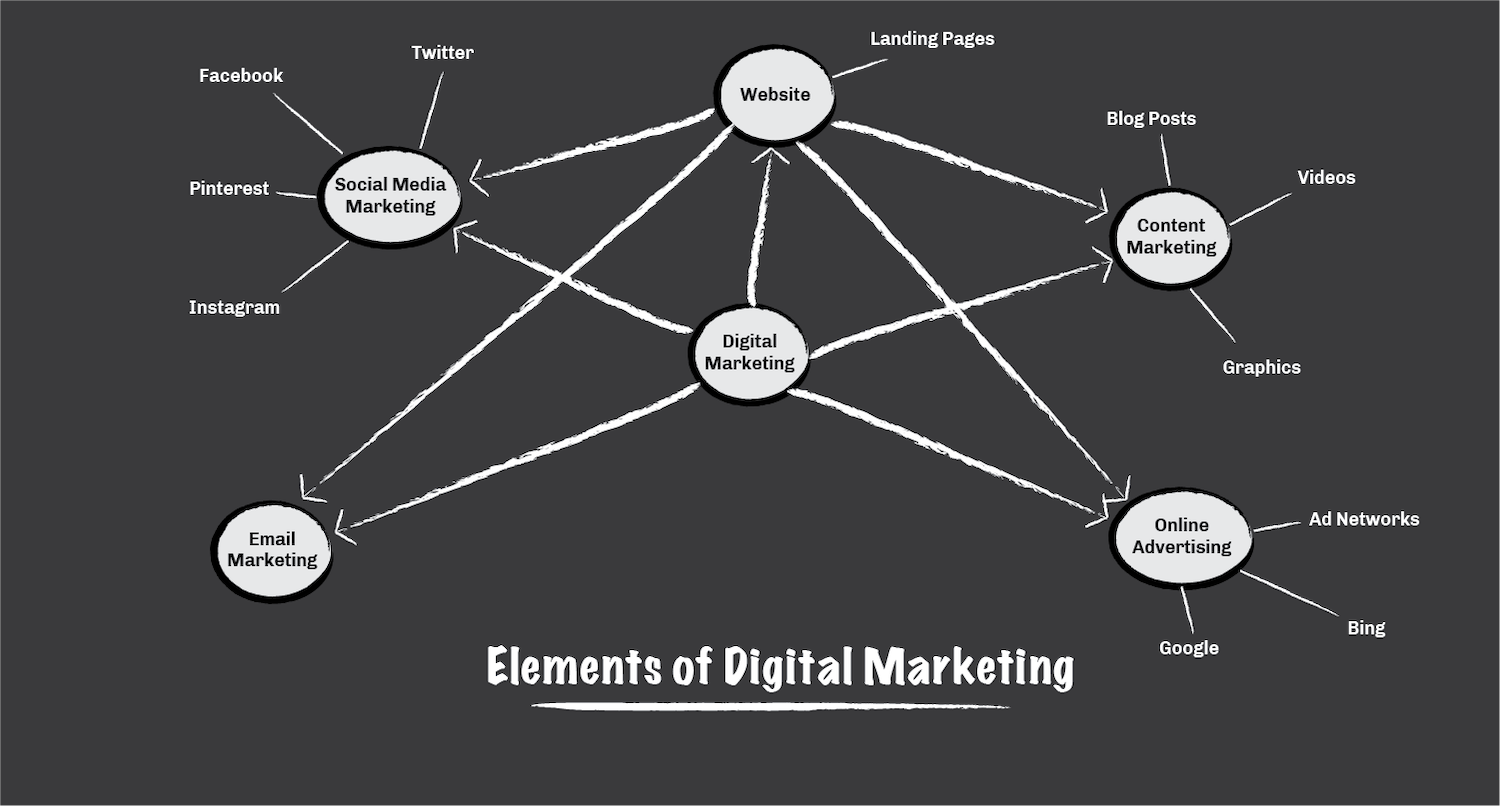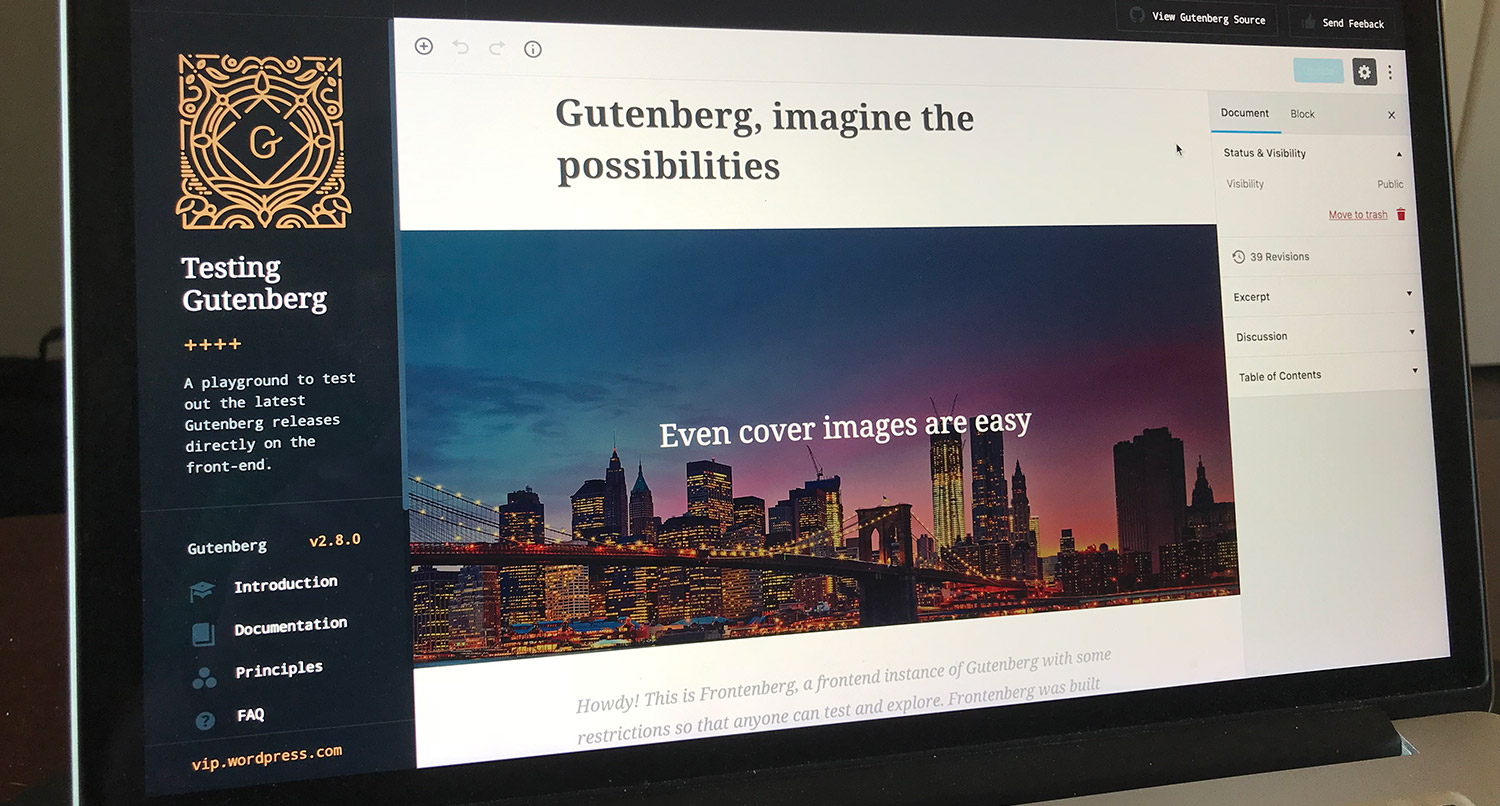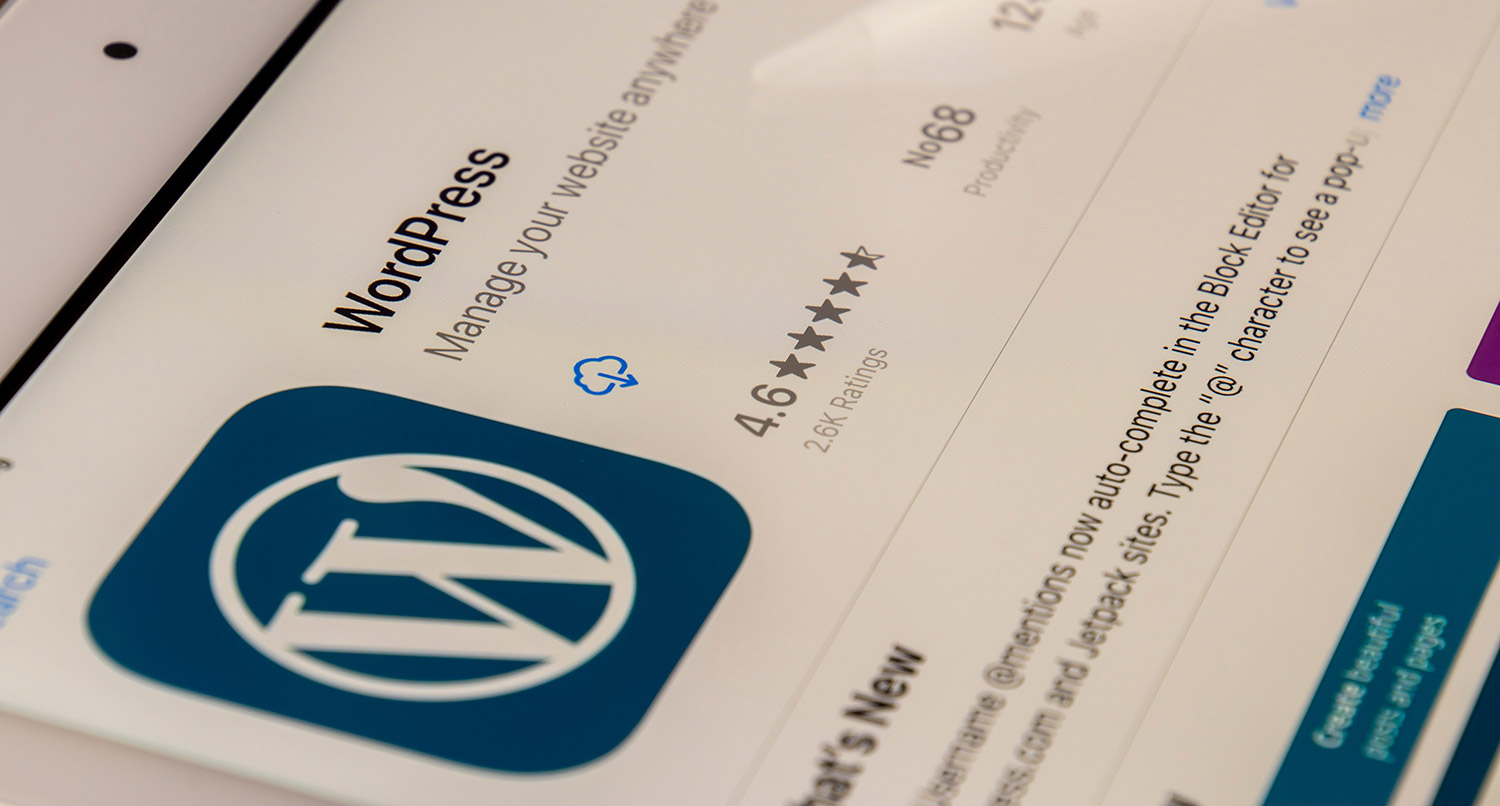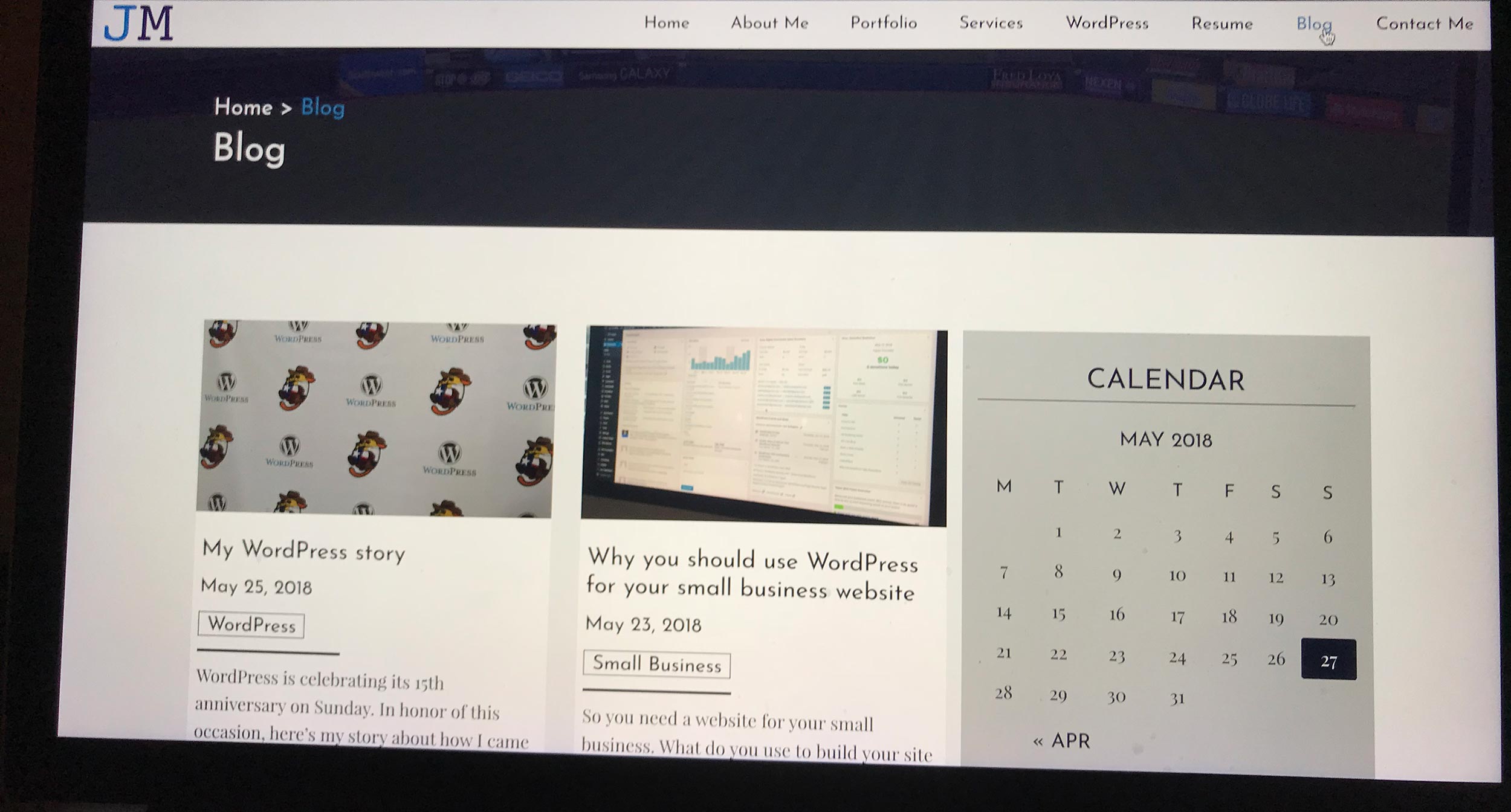Digital marketing is a pretty big topic, and there are a lot of different moving parts and elements that make it the beast that it is. And knowing that they exist and a little bit about what they do can go a long way towards helping you develop a digital marketing strategy that helps your business.
I do want to note that each of these elements (save maybe the landing pages) are pretty lengthy topics, and this book will only cover websites and landing pages. The rest are listed here so that you know about them and a little bit about what they do for digital marketing. I’ve listed resources at the end of this section that you can use to learn more about the other elements.
Website
Your website is the most important part of the digital marketing puzzle. It is the center of everything you’re going to do online to advertising and a lot of offline advertising as well. All of your marketing efforts are going to lead back to your website.
For this reason, it needs to basically be perfect. It needs to have a strong backend foundation, including web hosting, that ensures that it’s working 24/7, because unlike a physical location, your website should never be “closed”. Also, it needs to have a good, solid design to keep people interested, though you don’t need flashy design.
You’ll also need to make sure the website is laid out in a way that is easy for everyone to navigate no matter what technology they use. You’ll need to think about how you want your visitors to move through your website so that you get them to complete the goal that we discussed in the last section. And you’ll need content — text, photos, videos, etc. — to go along with the website and convince people to complete your goal.
This book focuses a lot on the website piece of digital marketing because without it, everything else is pretty futile. If there’s only one thing you learn from this book, I hope that it’s how important a website is to your marketing effort in the 21st century and, by extension, your business.
Get Insights on How to do a Small Business Website Right!
Are you looking to get some help with your small business’ website, but aren’t quite in a spot to take that next step? No worries! I’ve got you covered with a small business newsletter. This weekly newsletter will talk about a different subject related to websites and small businesses each week, as well as highlight blog posts that can help you out. This will help you optimize your business’ site as much as you can while you get yourself into a position to take the next step for your website.
"*" indicates required fields
Landing pages
While yes, the landing page is a part of the website, when it comes to digital marketing, it plays a large enough role that it deserves its own mention. Depending on what you want your website to do and what your business is, these are going to be the most important pages on your website. This is where that prospective
These pages could be for a service that you offer, or they could be for a specific productor a sale (if you sell multiple products). In a way, your product pages are semi landing pages, just ones that look more like your website. But if you’re creating an online or offline ad that directs a person to a URL, this is the type of page that you want to direct them to.
Typically, these pages look a little bit differently than every other page on the website. You want to minimize distractions that could lead visitors away from that page. It all has an organized goal to get the user to take that next step in your sales funnel. So you want a minimal header and footer and no links away from that page.
We’ll talk more specifics about the design of landing pages when we get to the design step of the “How to Build a Website” process. In the meantime, be thinking about what landing pages you’re going to need to have and what they need to do to help your website be successful.
Social media marketing
Social media is a giant in the marketing world. And while the different social networks will come and go, as a marketing tactic, it’s here to stay for a while.
Specifically, social media marketing is the use of the different social media platforms to share your content to a wider audience. While it might vary depending on who you talk to, I’m also including both organic and paid posts and ads in this definition.
Social media is a great place to interact with customers and prospective customers. You can have near instantaneous conversations with people. And people can talk to each other as well, which can be great if you’re looking to build an online community, though you will need to moderate it to make sure things don’t get out of hand.
You can share your posts, videos, any graphics you might have and updates about your business. You’ll really want to make sure you have a strategy of what you post, when you post and what is the goal of each of your posts to make sure that your efforts are efficient. While you can certainly just dive right in, again it’s pretty helpful to make sure you know what you’re doing ahead of time.
You don’t need to be on every single social networking site out there. What you use depends a lot on where your target audience is. In all likelihood, you’ll probably be using Facebook, Instagram and maybe even Twitter.
Content marketing
Content marketing is, well, the creation and sharing of content on your website that brings people in and eventually gets them to convert into a “customer”. These bits of content can be anything from a simple blog post to photos to videos to even podcasts. If you’re creating content with the goal of getting people to your website, then you’re participating in content marketing.
This is probably the hardest of the elements that we’re going to talk about. It involves a lot of work. You’ll need to do keyword research to figure out what you need to write about. Then you need to make sure you’re creating great content that people are going to want to engage with and share. And then you need to find a way for people to move from that piece of content to your sales pages.
But the payoff once you nail it is great. If you create great content that people want to share on social media and their own blogs, you’re going to get links that help out your content’s SEO, which means more people coming from search results and hopefully turning them into customers.
A lot of things around digital marketing are marathons and not sprints. But content marketing takes that to the nth degree.
Email marketing
Have you ever purchased something or added your email to learn more about something, and then got a lot of emails from that business about their product or service? Well, you’ve experienced email marketing. Sure, you might send those emails right into your digital recycling bin, but it is a part of digital marketing.
Getting email marketing right is certainly a challenge. You don’t want to annoy people with too many emails that simply say “Buy this product”. That’s one way to get them sent directly into the trash and for them to unsubscribe. At that point, it’s probably best that you didn’t even run the email marketing campaign at all.
Instead, you need to find a way to make the email worthwhile for your subscribers. In addition to giving updates about your business and adding calls to action for your products and services, you might want to give tips or discuss a topic that could help your customers out.
And if you think that email marketing is dead or on the way out, Litmus marketing found that emails typically give a return of $42 for every $1 spent on a campaign. And SaleCycle found that 59 percent of respondents to their survey said that email marketing influenced their decision to buy a product.
So if you’ve got the time, it might be worth seeing if an email marketing campaign could help your digital marketing efforts.
Online advertising
Online advertising essentially covers every bit of advertising that you do outside of social media marketing. This includes Google Ads, Bing ads and other ads that appear online. From here, we can break it down even further into display ads and search ads.
Display ads are the ads that include images as well as text that appears in advertising spaces on websites. Go to any newspaper website, and you’re going to see a ton of display ads. And sometimes video can be included, particularly on video services like YouTube and Vimeo. These require great designs as well as quality sales text. So you might need to hire a graphic designer in order to help you out if you go down this route.
Search ads are a little bit easier for beginners to start with. Google Ads makes it super simple to get started and will walk you through how to create a new ad campaign. You’ll need only text to get started, but that text will need to be convincing enough to get people to click on your ad and learn more.
Again, there’s a whole lot more to this, from how to write ad copy to how to manage ad campaigns. If you’re serious about wanting to run online ads for your business, you’ll really want to take some time to learn more about it.







